Coaching Quote of the Day 11th January 2012
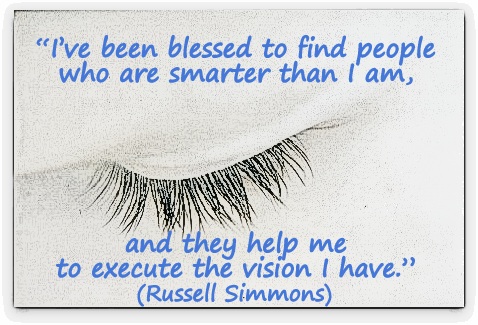
“I’ve been blessed to find people who are smarter than I am, and they help me to execute the vision I have.”
(Russell Simmons)

“I’ve been blessed to find people who are smarter than I am, and they help me to execute the vision I have.”
(Russell Simmons)
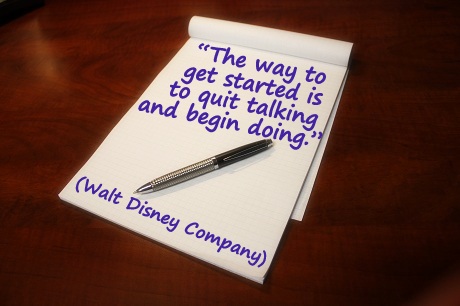
“The way to get started is to quit talking and begin doing.”
(Walt Disney Company)
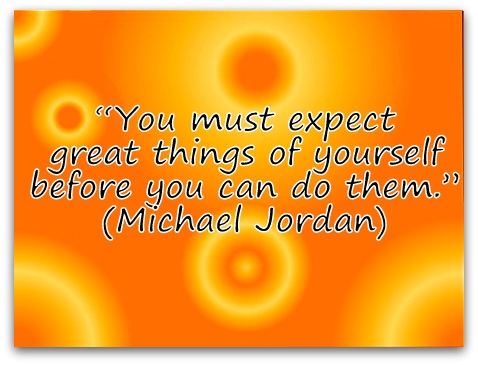
“You must expect great things of yourself before you can do them.”
(Michael Jordan)

“Some people dream of great accomplishments, while others stay awake and do them.”
(Anonymous)

“The shortest answer is doing”
(English proverb)
Coach Frederique Murphy shares her experience and thoughts in today’s guest post.
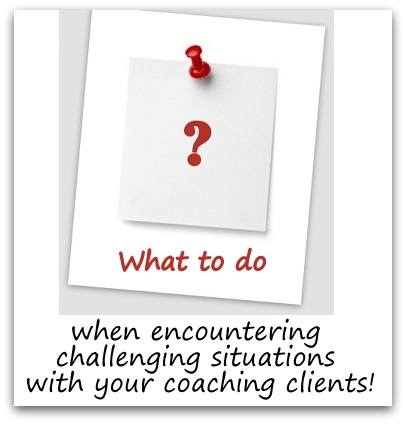
This is my fifth guest blog post, and as with every blog posts, I thrive to tackle topics that might not necessarily be often tackled! Earlier this year, when Jen and I discussed the dates for my blog posts, I told her that I knew exactly what my final 2012 blog post would be, and here it is! In this article, I want to talk about, the events when you, as the coach, encounter some challenging situations with your coaching clients.
After close to 5 years of coaching, I can say that I have encountered all of these; and, yes, I am saying it out loud, and publically: it is actually rare for coaches to talk about these situations, even though, they happen. I want to break that pattern, and help you through these. I believe that these situations have either happened to you, or might happen in the future as you continue to stretch and grow yourself and your coaching practice. I also want to say upfront that in most cases, these situations are not a negative reflection of your coaching services. But, as these are often unspoken, when they happen, many coaches feel it was their fault and go into a shame/guilt/unworthy destructive cycle.
So, let’s openly talk about these, and see how we can shift and move forward.
Your coaching client does not “show up”.
And, I don’t mean physically! You know, when they sign up to your coaching programme, and, somehow, don’t “show up”; they might arrive late to your sessions, they might not listen to your programme classes, they might not read your emails, they might not open your attachments, they might not reply to you, etc, etc, etc; these type of things. You know, as the coach, that showing up and playing fully is critical to their success; your coaching programme might be one of the best programmes out there, and yet, it will not do anything for them if they don’t utilised it. It is a challenging situation, as you know that they are not utilising the programme, and know they would get even more out of it, should they do, of course.
So, what do you do? Address it with them, and I suggest to invite them to an additional session (I’d not address this during one of their coaching sessions), but keep it separate and frame the session to find out how they are getting on. There will be 3 scenarios:
Your client does not take actions.
This is a similar situation, as the first one. Here, something for you to be very clear about is that acting is 100% their responsibility; they will not get results if they don’t act, and you cannot guarantee them results, as you are not the ones taking the actions. So, it comes down to their actions
So, what do you do? Address it with them, and I suggest to invite them to an additional session (again here, I’d not address this during one of their coaching sessions), but keep it separate and frame the session to find out how they are getting on, and share your concerns with them. See where this conversation leads you; ultimately, it will once again be up to you, and you might be a coach, who is not happy working with clients not taking actions, and decide to end your relationship.
Your coaching client does not like it when you push their buttons.
Another challenging situation, right? I want you to ask yourself: is pushing buttons part of your role as a coach? I believe it is, in fact, an integral part of your coaching; when something needs to come out but does not, you might need to make it come out and however way you will do it, it might cause the client to feel the heat; you are not their friend, you are their coach, and your outcome is to do whatever is needed to support them, and sometimes supporting them means to push some buttons to get them moving forward.
So, what do you do? Address it with them, and I suggest to invite them to an additional session (again here, I’d not address this during one of their coaching sessions), but keep it separate and frame the session to find out how they are getting on. This will enable you to openly discuss and see how your coaching client is, and to (re)share with them your role, values and practices. However way you do it, I want to strongly emphasise the fact that I believe you should not change your style to suit your clients. In my previous article Mirror, Mirror On The Wall, Who Is The Best Of Them All? I talked about coaching styles, and reminded you that “Your coaching style will be the best for some, and completely clash for others.” And this is what might be happening. During your conversation, you will either decide to make it work, or to end the relationship if you feel this is not going to work. Again here, it is entirely up to you.
Your client expects ABC, and you give them XYZ.
This situation is another challenge in itself! When you are coaching your client, your key outcome is to coach them to the best of your ability. You come to their sessions, without any agenda. However, very often, your coaching client will come to their session with their agenda, their ABC. And, here is what happens; they want ABC, but, for whatever reason, they also come in with a bunch of “stuff”, and you, as the coach, make a judgement call, in tackling the stuff, as you professionally know that once it is tackled, it will make it easy to then move their focus onto ABC; so, you do, XYZ, as you feel, it is what will best support your coaching client in that session. The thing is, they don’t know what’s going on, they are not trained as coaches, so from their point of view, they’ll see things as wanting to get ABC, but getting XYZ instead; and it might well have been that XYZ created huge shifts and breakthroughs, but, it was not ABC, bottom line, they did not get what that wanted.
So, what do you do? In this case, I believe, that instead of being a “what do you do?” question, it is actually a “what can you do post-session? question. Because, you did what you decided was best at the time of the session, so now, it is looking into the post-session follow-up to ensure your client remains satisfied. It has happened to me a couple of times, and should these scenarios happen again, I would do exactly the same things, as in, do the XYZ first and then, deliver a post-session action to ensure you address the ABC.
While these situations are challenging to face, I actually believe that experiencing these scenarios will make you a stronger coach, as each of these will be beneficial to your growth. You will learn from each of these, and if necessary, refine some of your internal and external processes, that will make your practice stronger too. Now, for this to happen, and for you to be able to view these situations as something positive along your journey, you need to ensure that as these happen, you discuss them with your own coach, so that he/she can help you through these. This is very important.
This is not an exhaustive list, and the recommendations I am giving are the ones that have worked for me; but there are plenty of other ways to tackle these challenging situations. Remember, the key thing is that you should do whatever you think is best for you and your client; I truly believe that facing these situations head on is the best first step. Be proud of who you are as a coach, and stand by your practice.
Have you ever encountered one of these 4 challenging situations with your coaching clients? What did you do? I’d love for you to share, this will be so helpful for other coaches. Comment below!
 Frederique Murphy (@IrishSmiley on twitter) is a mindset strategist, who founded her business to focus on her passion: transformation! Thanks to her Mountain Moving Mindset programme, Frederique empowers individuals, corporate executives and business owners to master their mindset, so that they can move mountains and bring their life, career and business to a whole new level! She shares her M3 Power through her coaching & mentoring packages, her published books & articles, her award-winning blog and newsletters, and her unique live events. For more information on Frederique’s transformational range of products and services, visit FrederiqueMurphy.com, get your free M3 Power, and start climbing now!
Frederique Murphy (@IrishSmiley on twitter) is a mindset strategist, who founded her business to focus on her passion: transformation! Thanks to her Mountain Moving Mindset programme, Frederique empowers individuals, corporate executives and business owners to master their mindset, so that they can move mountains and bring their life, career and business to a whole new level! She shares her M3 Power through her coaching & mentoring packages, her published books & articles, her award-winning blog and newsletters, and her unique live events. For more information on Frederique’s transformational range of products and services, visit FrederiqueMurphy.com, get your free M3 Power, and start climbing now!
Coach Julia Neiman shares her expertise and knowledge in today’s guest post:
The following “Lesson” is an excerpt from my new Ebook, 31 Powerful Lessons: Empowering Teens and Young Adults to Develop an Entrepreneur Mindset. While the majority of my clients over the years have been transitional age youth from 18 to 25 years old, I am now coaching parents, teachers, coaches, mentors, social workers and others who work with this age group. Procrastination is something that I find affects people of all ages and as coaches, I’m sure you’ve seen this in your clients and perhaps even have a touch of it yourself. I know I do.
In this lesson, I present 5 common beliefs and attitudes that lead to procrastination in the hopes that coming to understand why we procrastinate can lead to our breaking this habit. I hope you find it useful.

by Julia Neiman
Telling ourselves and others that we are going to do something is a far cry from actually doing it. The distance between intention and behavior is often quite large. Statistics show that for every intention 1 in 2 people will end up not following through on their planned action. That’s a lot of nothing getting done.
One of the causes of this is the action of constantly putting things off, known as procrastination. A key attribute of procrastination is a tendency to over think a particular course of action to the point that you spend most your time thinking rather than actually doing. This state is commonly known as paralysis by analysis. I’ve been known to procrastinate once in a while. I try not to allow myself to do that because it leads to feeling overwhelmed then I just want to crawl into bed and pull the covers over my head.
Sometimes by thinking less we are able to achieve more.
Here are five common beliefs and attitudes that lead to the debilitating effects of procrastination:
Many people talk themselves out of working towards their goals because they are afraid they may fail. To their way of thinking, by not taking action they are able protect themselves from the possibility of failure.
Most procrastinators have a strong idea of what they want, but often the fear of failure and the thoughts that surround this paralyzing emotion are so intense that productivity is slowed down or stops altogether.
Another common attitude within the mindset of a procrastinator is the need for everything to be perfect before work commences. Often this involves optimizing one’s environment and work space so that maximum comfort and ease is created.
The problem with this mindset is that working environments are never ideal, and never will be, unless you are prepared to invest a significant amount of your own time creating the ultimate work environment.
Understand that there is no substitute for real productive action, so even if your workplace is not ideal it is advisable to forge ahead nevertheless. Thank goodness I’m not a perfectionist because my workspace is far from ideal.
Arguably a huge bias in the procrastinator’s thinking is the belief that time is an infinite resource. The common excuse “I will do it tomorrow” usually stems from an unconscious belief that there will always be time. Unfortunately this is not true, and for many procrastinators they end up looking back over their lives regretting they didn’t take the opportunities when they were presented to them.
It is so easy to fall into the trap of thinking like this, which is why if you are presented with a good idea, it is advisable that you act on it immediately.
Acting on your intentions often requires a leap of faith. Embarking on a worthwhile project always contains elements of the unknown.
The problem with many procrastinators is that they are terrified of taking a leap of faith into the unknown. They want a guarantee that their efforts will not be in vain.
This may result in the procrastinator doing unnecessary research in an attempt to further control the likelihood of their actions becoming a success. Obviously planning is important before beginning any major task, but at the same time excessive planning can inhibit your ability to act at the right times.
Another component of the procrastinator’s limiting mindset is the belief that everything, when taking constructive action towards their long-term goals will be plain sailing. Whenever hard work and long hours is mentioned a procrastinator is likely to put off whatever course of action they need to take.
All worthwhile projects involve overcoming difficulties and obstacles, and the procrastinator is often someone who foolishly believes that getting what you want shouldn’t be anything but easy.
If you can get past the mindset of the procrastinator, and you can begin actively working towards your goal, you may find that it becomes increasingly difficult to stop. You will find that over time you begin building up momentum towards your goals, to the point where everything is taken in your stride. There is no doubt about it, starting something is always the hardest part, but once you get in the grove your work flow will become more natural and easy.
“An object at rest tends to stay at rest; an object in motion tends to stay in motion” Sir Isaac Newton
 Julia Neiman is the Founder of Transform For Life, an online coaching program for teens, and Executive Director of Group Home Consultants, a nonprofit that provides independent living skills training to transition age foster youth.
Julia Neiman is the Founder of Transform For Life, an online coaching program for teens, and Executive Director of Group Home Consultants, a nonprofit that provides independent living skills training to transition age foster youth.
Julia has 20 years of experience working with troubled teens. She believes that their dreams matter and is passionate about helping them learn to make those dreams come true. To that end, Julia has just written her first book, 31 Powerful Lessons: Empowering Teens and Young Adults to Develop an Entrepreneur Mindset. The book is currently available only at her website as an ebook. Later this year the book will be available both as an audio book and a bound book.
Visit Julia’s website at http://www.julianeiman.com for a free download of a great organizational tool entitled, Get Stuff Done. Then check the Free Downloads Page for more free stuff.
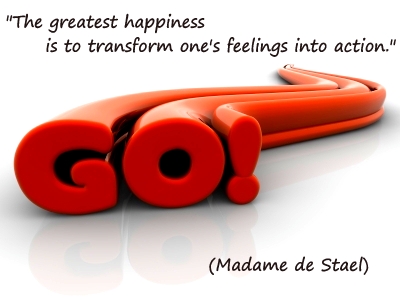
“The greatest happiness is to transform one’s feelings into action.”
(Madame de Stael)